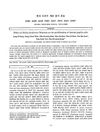 June 2011 in “Journal of medicine and life science”
June 2011 in “Journal of medicine and life science” Hizkia fusiforme seaweed extract can help promote hair growth.
 12 citations,
June 2023 in “Journal of trace elements in medicine and biology”
12 citations,
June 2023 in “Journal of trace elements in medicine and biology” Eating too much selenium can cause bad breath, hair loss, and nail changes, with harmful effects starting at low daily doses.
 15 citations,
November 2023 in “Immunity & ageing”
15 citations,
November 2023 in “Immunity & ageing” TLR4 is important in aging-related diseases and could be a new treatment target.
 8 citations,
February 2022 in “Scientific Reports”
8 citations,
February 2022 in “Scientific Reports” Medicinal herbs might treat hair loss by affecting genes and pathways related to lipid and glycerophospholipid metabolism.
5 citations,
October 2021 in “Clinical, cosmetic and investigational dermatology” Japanese patients with alopecia areata often have a higher BMI and consume more vitamin C, fruit, and retinol, which may affect their condition's development or severity.
 February 2018 in “Medical Hypotheses”
February 2018 in “Medical Hypotheses” Male pattern hair loss may have evolved to promote younger fathers for offspring health and survival, encouraging monogamy and paternal nurturing.
 September 2020 in “bioRxiv (Cold Spring Harbor Laboratory)”
September 2020 in “bioRxiv (Cold Spring Harbor Laboratory)” Different fish use the same genes to regrow teeth.
16 citations,
March 2021 in “EvoDevo” Different species use the same genes for tooth regeneration.
 419 citations,
January 2015 in “Journal of Consumer Research”
419 citations,
January 2015 in “Journal of Consumer Research” Corporate social responsibility can improve consumer ratings of product performance, especially when the company is seen as benevolent and consumers aren't experts on the product.
 29 citations,
March 2019 in “British Journal of Dermatology”
29 citations,
March 2019 in “British Journal of Dermatology” Acne is significantly influenced by genetics, and understanding its genetic basis could lead to better, targeted treatments.
27 citations,
January 2015 in “International Journal of Trichology” The supplement helps improve hair growth and reduce hair shedding.
 18 citations,
December 2021 in “Foods”
18 citations,
December 2021 in “Foods” Seaweeds contain beneficial compounds with potential uses in food, cosmetics, and health, but more research is needed to improve extraction and safety.
 14 citations,
May 2021 in “Marine Drugs”
14 citations,
May 2021 in “Marine Drugs” PDRN, derived from salmon sperm, shows promise in healing wounds, reducing inflammation, and regenerating tissues, but more research is needed to understand its mechanisms and improve its use.
 9 citations,
November 2022 in “Applied sciences”
9 citations,
November 2022 in “Applied sciences” Marine algae compounds may improve skin health and promote hair growth.
 6 citations,
May 2022 in “Frontiers in Microbiology”
6 citations,
May 2022 in “Frontiers in Microbiology” Marine microbes could be used in cosmetics for sun protection, skin care, and possibly preventing hair loss.
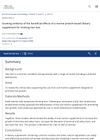 5 citations,
September 2017 in “Journal of Cosmetic Dermatology”
5 citations,
September 2017 in “Journal of Cosmetic Dermatology” A marine protein-based dietary supplement can safely boost hair growth and reduce hair loss in people with thinning hair.
 2 citations,
May 2023 in “Marine Drugs”
2 citations,
May 2023 in “Marine Drugs” Marine-derived saccharides may help reduce aging effects on skin and hair by promoting cell growth and collagen production.
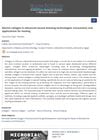 December 2024 in “Microbial Biosystems”
December 2024 in “Microbial Biosystems” Marine collagen helps wounds heal faster and better than regular dressings.
 November 2023 in “International Journal of Pharmaceutics”
November 2023 in “International Journal of Pharmaceutics” New hair loss treatment using marine collagen and dissolvable needles improves hair growth.
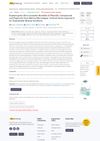
Marine macroalgae contain compounds that can improve skin health and have cosmetic benefits.
 June 2023 in “Skin Research and Technology”
June 2023 in “Skin Research and Technology” The supplement with amino acids, iron, selenium, and marine hydrolyzed collagen improved hair growth more than drug treatment alone, with most people tolerating it well.
Marine sponges from Tabuhan Island can inhibit enzymes linked to Alzheimer's and hair loss.
 April 2017 in “Journal of dermatology & cosmetology”
April 2017 in “Journal of dermatology & cosmetology” The marine protein complex, Viviscal®, was found to effectively reduce hair loss and improve hair, skin, and nails quality in women.
 November 2022 in “Journal of Investigative Dermatology”
November 2022 in “Journal of Investigative Dermatology” Fish-derived collagen may help hair grow longer and affect hair stem cells, while bovine collagen could benefit hair stem cell maintenance, potentially aiding in hair loss conditions.

Collagen peptides may help maintain hair growth and could be beneficial for hair loss conditions.
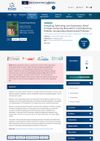 February 2024 in “Current Drug Delivery”
February 2024 in “Current Drug Delivery” The new minoxidil emulgel with marine-based polymers shows effective controlled drug release for hair growth treatment.
 December 2023 in “Journal of biobased materials and bioenergy”
December 2023 in “Journal of biobased materials and bioenergy” The algae grew better and fixed nitrogen more efficiently when they worked together, using nitrogen and iron.
 9 citations,
July 2014 in “PubMed”
9 citations,
July 2014 in “PubMed” The review doesn't clearly say if biotin, caffeine, melatonin, a marine extract, and zinc are effective for treating hair loss.
 2 citations,
January 2022 in “Dermatologic Therapy”
2 citations,
January 2022 in “Dermatologic Therapy” Natural products like saw palmetto, caffeine, melatonin, marine extracts, rosemary oil, procyanidin, pumpkin seed oil, and cannabidiol oil could potentially treat male hair loss.
 March 2024 in “Journal of functional foods”
March 2024 in “Journal of functional foods” Collagen peptides from marine and bovine sources may help prevent hair loss by affecting hair follicle stem cells differently.


























